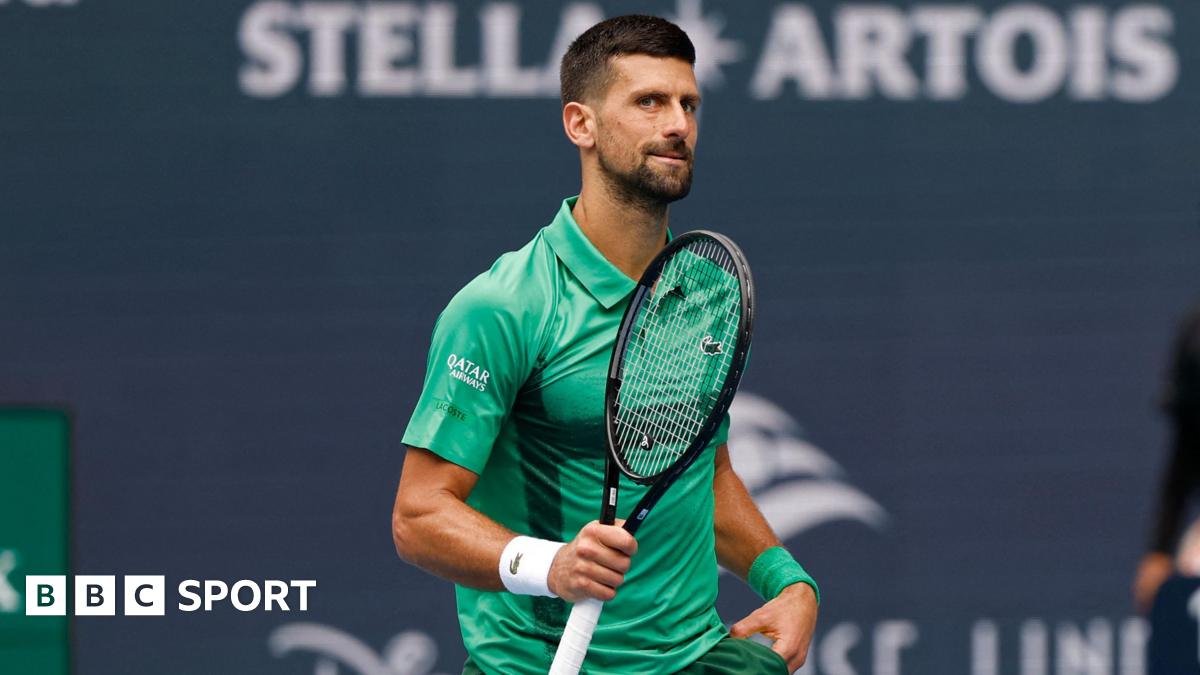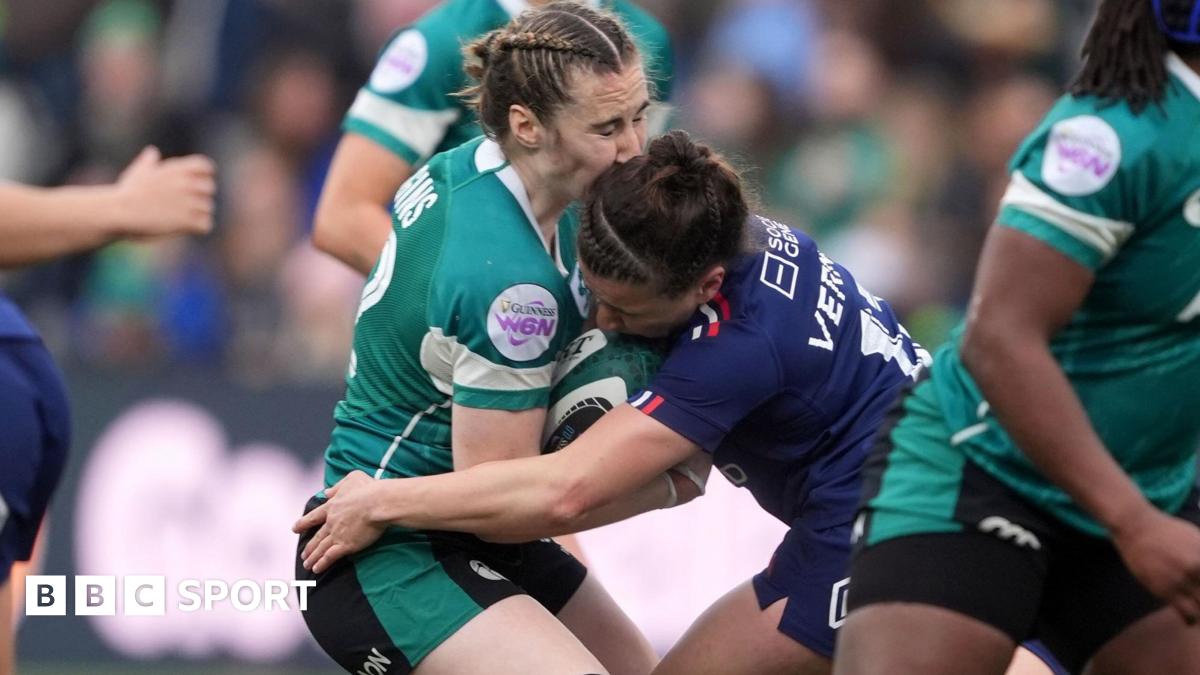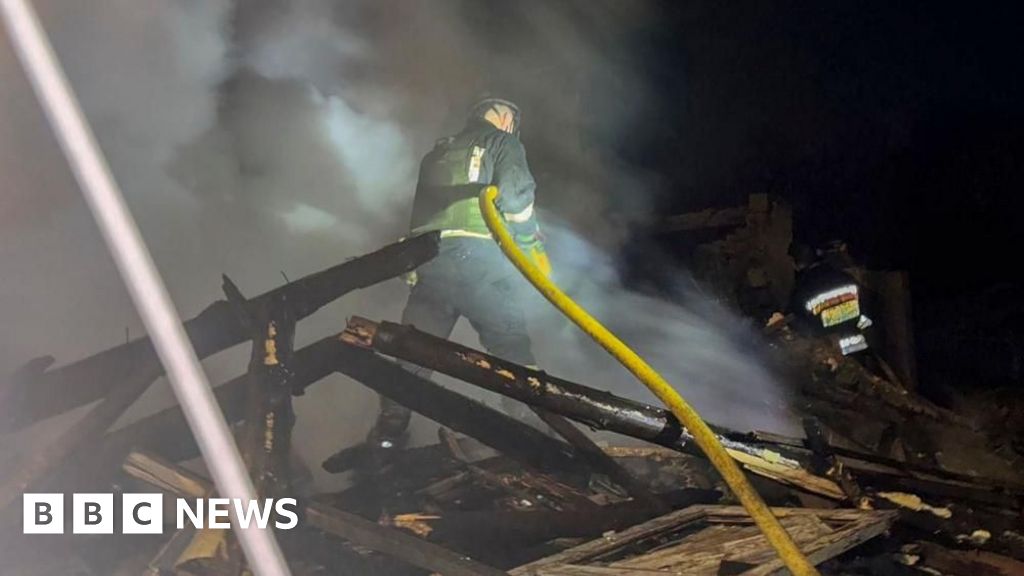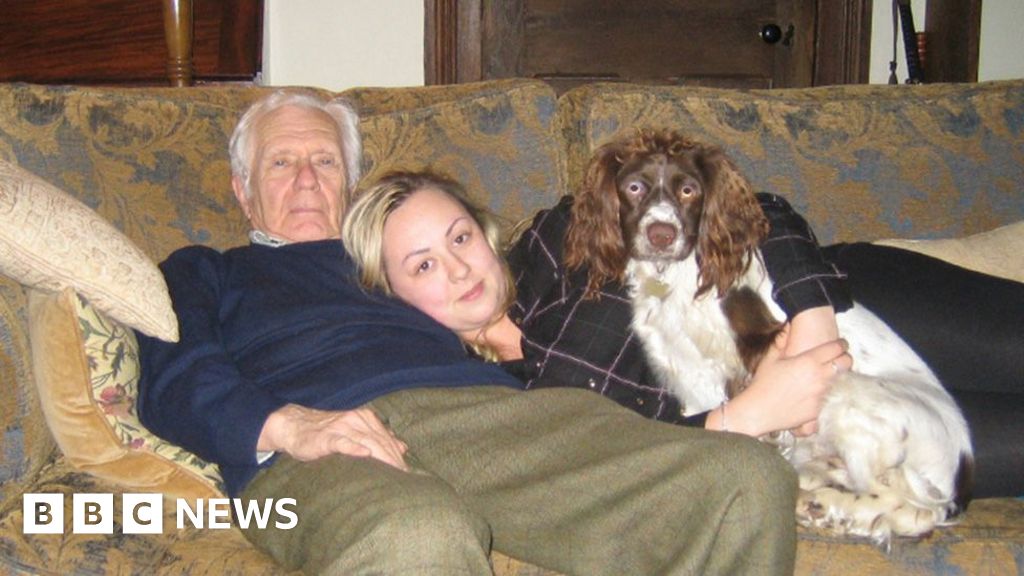
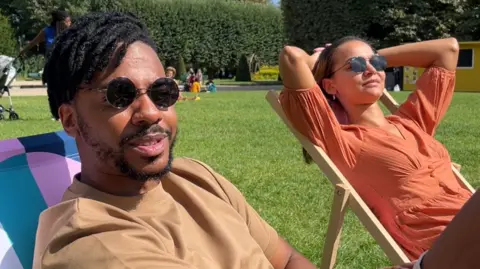 BBC
BBC
Max (L) said he was proud of the men's rugby sevens win
Ahead of the Olympics, some Parisians were grumbling. Security issues and overcrowding had been among locals' top concerns in the preceding weeks, which were also an immensely turbulent period in the country’s politics.
Making matters worse was Friday’s wave of co-ordinated arson attacks on the French railway network that ruined the travel plans of hundreds of thousands of people.
But a vibrant opening ceremony and an early flurry of French medals have started to make many in the city optimistic.
And as the rain clouds clear, some of the city's residents say the sport is starting to bring France some much-needed togetherness.
The morning after France snatched its first gold of the Games, the sun finally shone on a fan zone in the city’s 13th arrondissement, where couples and families lounged in deckchairs, watching a big screen.
A man named Max was jubilant after the French victory in the men’s rugby sevens. “I was very proud,” he said. “But I was always excited about the Olympics, even if some people are not.”
The tone of the sporting extravaganza so far was perhaps set by Friday’s ambitious opening ceremony, which seemed to surprise many locals in its smooth execution.
Director Thomas Jolly appeared to pre-empt the possibility of something going wrong, as one of the pre-filmed inserts showed torchbearer Zinedine Zidane on a broken-down metro train.
“I’m pretty sure that everybody who saw the ceremony changed their minds,” said Pierre, a cyclist who had been annoyed beforehand by the vast security lockdown.
“I was not very optimistic about the Olmypics. I have to say that I was a little bit grumpy,” said a rugby fan named Vincent. “But now I find the ambience very cool.”

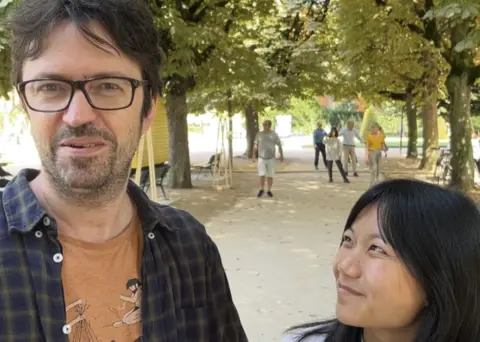
Vincent admitted he had been "grumpy" before the Games began
Spirits were undampened as the downpours that characterised the ceremony continued into the weekend. Cheers and spontaneous renditions of French national anthem La Marseillaise broke out from crowds who lined the streets to watch cyclists braving treacherous conditions in the time-trial competitions.
Curious locals perched on their upper-floor window ledges, or balanced themselves precariously on street furniture to get a good view. Police officers could not resist taking photos. Even delivery cyclists, evidently perplexed by the many road closures, paused to drink in the action.
For ice-cream seller Ludwig, who had set up stall on the Boulevard Saint-Germain as the competitors whizzed past, sales were faltering in the wet weather, but all that mattered was the “beautiful atmosphere” that the global sporting contest had brought.
And as French athletes notched up some early sporting successes, it started to look like the feelgood factor might last beyond the opening ceremony. Pedestrians poked their heads into bars to watch TV screens and applaud as some of the first medals rolled in.
The Games were proving an “incredible” display of French culture and togetherness, said two judo fans who had dressed up as beloved comic characters Asterix and Obelix.
Speaking outside the Champ de Mars Arena, Thomas-Felix and Sebastien said it was disappointing that that French competitor Luka Mkheidze was defeated in the final of the men’s 60kg contest, but at least they were surrounded by plenty of compatriots and could “all cry together”.

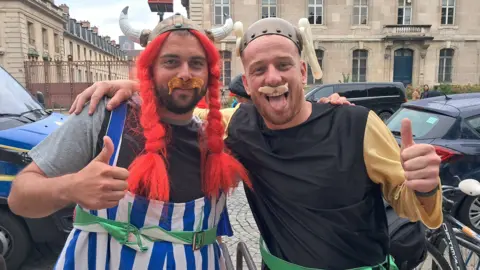
Sebastien (L) and Thomas-Felix (R) saluted the French togetherness
Some Parisians are pleased to see something other than politics starting to fill the headlines. For Caroline Loire, who is organising street theatre during the Games, the sport represents "a break".
A matter of weeks ago, a hastily-formed left-wing coalition triumphed in the second round of the snap parliamentary election - after the far-right National Rally topped the polls in the first vote. France is now in the hands of a caretaker government, its future uncertain.
“[President] Macron wants us to forget all about the politics, but we won’t,” said Adrienne, an arts student who was excited to watch the Olympic table-tennis. “We will appreciate the sportsmen and sportswomen - but we won’t forget.”
Another man, Alexandre, was doubtful that the Games would have a long-term galvanising impact, but felt it was a good chance for France to “show what it can do”. That was important, he said, in light of Friday’s attack on the railways. “It’s a heavy situation,” he lamented.

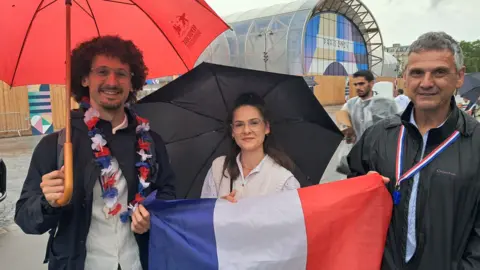
Alexandre doubts the Games will unite people in the long-term
Even if the Games do manage to distract many people for a time, the enthusiasm is far from universal.
“I’m not excited. I don’t think Paris is the right place for it,” said a student, Melissa, who suggested another city would have been better equipped to deal with the crowds.
There have been fears that the Parisian infrastructure could groan under the strain of so many visitors, but some of the most central streets and even its metro stations have felt eerily quiet - perhaps as a result of many locals abandoning the city for the summer.
On Saturday, some barriers remained on the Île Saint-Louis, an island in the Seine that was cordoned off for the opening ceremony. Footfall seemed relatively low.
Some businesses that were open said it remained to be seen whether an influx of Olympic tourists would make up for the lost trade. The Games were good news for France, but “not good for business", said one restaurateur, gesturing at a row of empty tables.
Further south, spectators and Games delegates were starting to seek out the bars and cafes of the Latin Quarter – although one Greek outlet named Olympie was conspicuously closed.
“I don’t care that the Olympics is in Paris,” said one bistro-owner, Jean-Louis, who was hustling for passing customers.
“This is just a view of France, but it’s not reality,” he said of the Games. He said poverty was a more important issue for millions of people. After all, he said, “the Olympic Games don’t give me something to eat”.
 8 months ago
315
8 months ago
315
